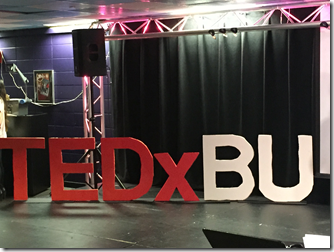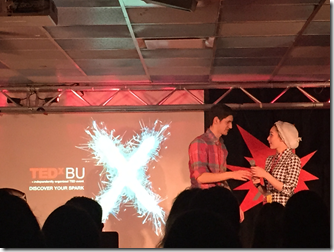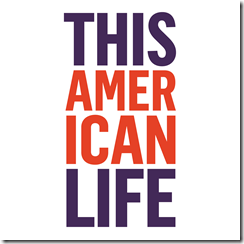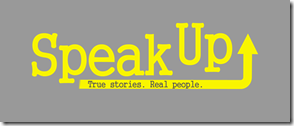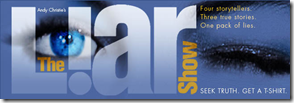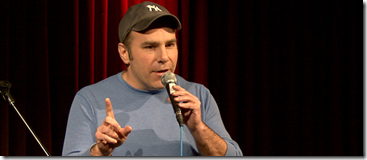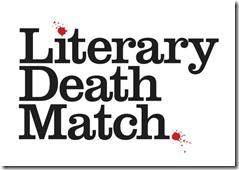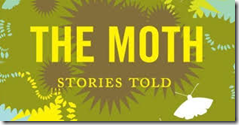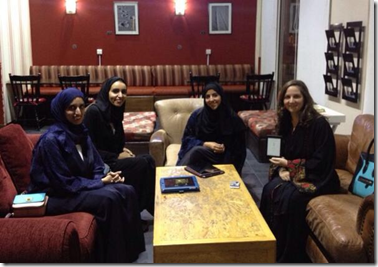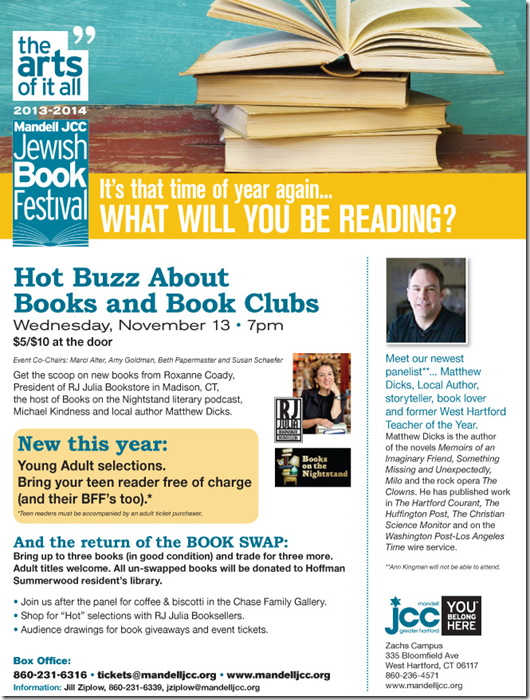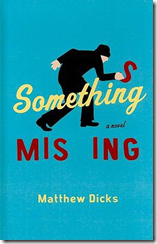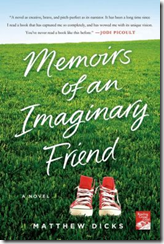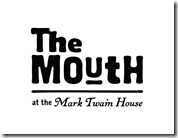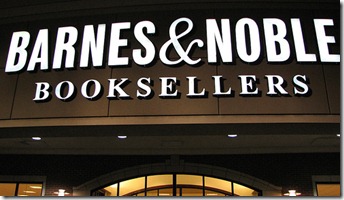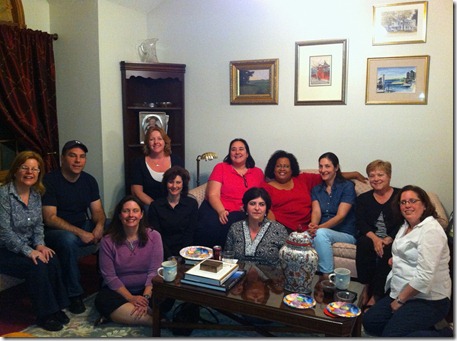I took my friend to a local bookstore to listen to a well-known, New York Times bestselling author speak. He was excited. He had never listened to an author speak before (other than me), and my hope was that this would be one of many author events that we could attend together in the future.
We joined an audience of more than one hundred excited readers in a library adjacent to the bookstore. Most were clutching the latest copy of the author’s book. Many were literally sitting on the edge of their seats in anticipation. I was one of them.
The author was introduced, and he thanked his audience for coming. He then proceeded to read from his book for 45 minutes without stopping. When he finished, he took three questions from the audience and retired to the rear of the library to sign copies.
On the way home, my friend told me that he would never attend another author event again.
I tried to explain that not every author reads for 45 minutes. Many tell stories about the writing of their book. They talk about their writing process. They share the sources of inspiration. Some will happily answer dozens of questions. Quite a few are genuinely entertaining. Funny, even.
My friend listened intently and then asked an important question:
“If that’s the case, how am I supposed to know if I’m walking into an interesting talk or a straight-up reading like the one I was just subjected to?”
I’ve been pondering this question ever since. As authors (as well as event managers and publicists), we do a disservice to readers by not making it clear what to expect when we plan on speaking at a bookstore, library, school or similar venue. We seek to provide customers with a meaningful experience that will build brand loyalty, but we fail to define what that experience will be.
I’m not saying that reading to your audience for 45 minutes is necessarily wrong. In truth, many of the people seemed to enjoy this particular reading a great deal. Others (like my friend) were visibly annoyed. But what this author does when he speaks and what I do at my author events are two entirely different things. If we are not clear about our intentions to prospective audience members, we run the risk of alienating readers.
After much thought, I have come up with a solution. I would like to propose breaking the author appearance down into four distinct categories and advertise all future events using these categories. I want to make it clear to readers about what they should expect when they arrive to hear an author speak. I believe that this could go a long way in improving overall customer satisfaction and increasing the size of our audiences.
The Signing
I am not a fan of this format and often reject offers to appear in this capacity, but I’ve arrived at bookstores in the past and found myself unexpectedly forced into this type of appearance. At a signing, the author sits, usually near the front of the store, and signs books for anyone who is interested in purchasing one. Though this can be a waste of the author’s time, it can also be surprisingly effective if managed properly.
At a signing at Market Block Books in Troy, New York, for example, booksellers introduced me to their customers over the course of three hours, and I found myself talking to a constantly changing audience for nearly the entire time. It wasn’t a formal talk, but it gave me a chance to speak to readers on a more personal level. Bookseller Stanley Hadsell made it feel as if the bookstore had been transformed into my own personal living room for the morning, and I had a series of guests stopping by for a visit. When handled like this, the signing can be extremely successful for both the bookstore and the author.
More often, however, this type of event is a disaster. I’ve been stuck at a table near the front of the store for two hours and completely ignored by the staff. While I am more than willing to reach out to prospective readers, this format often makes me feel more like a carnival hawker than an author.
At one of these events, I managed to do quite well even though I was seemingly forgotten by the staff. I sold more than 20 books over the course of 90 minutes and also booked a wedding for my DJ company with a customer who had read my bio online before stopping by.
“I’m killing two birds with one stone,” she said.
This, however, was the exception. Not the rule.
I once arrived at a Borders planning to speak only to discover that my event was scheduled as a signing. I was placed at a table near the front of the store and encouraged to greet customers as they entered. But when more than 20 people arrived to listen to me speak, I asked if we could convert the signing into a more formal talk. When the manager refused, I invited my audience to join me in the café. We turned the chairs in one direction, moved the book display onto a café table, and I conducted a more formal talk anyway. Sadly, the manager was never even aware of what I had done. She never returned once to check on me.
If done well, the signing can work. Unfortunately, it is rarely done well.
The Reading
Readers who attend this type of event should expect that the majority of the time will be spent listening to the author read from his or her latest book. The author may take questions, but this is not guaranteed.
Once again, this is not necessarily a bad thing.
I have seen David Sedaris speak on more than one occasion, and this is essentially what he does. He reads from his most recent book as well as unpublished essays and the work of an author who he is promoting. In doing so, he puts on a tremendous performance, and I wouldn’t have it any other way. But there is a difference between a David Sedaris essay and a novelist who is reading the first three chapters from his latest literary novel. One may be quite entertaining while another may not.
This is obviously not my friend’s preferred format, nor is it mine. But I also know that not every author is able to speak easily and comfortably to a large audience. Just because authors can communicate well on the page does not mean that we are all public speakers. The reading is a way for some authors to interact with readers in a way that is most comfortable for them. They should simply make it clear what they intend while promoting the event.
The Book Talk
At an event like this, readers should expect the author to speak primarily about his or her latest book. This will likely include a short reading, but much of time will be spent listening to the author speak extemporaneously about the book, the process of writing the book, the inspiration for the book and taking questions from the audience. This tends to be an ideal event for audiences that have already read the book, though previous knowledge of the book is not necessarily required.
For a long time, this was the kind of talk that I delivered on a regular basis, and it worked well. It still works well when I visit with a book club.
But what I eventually discovered was that some of the stories that my audiences liked best had little to do with my latest book and more to do with my life as a writer, a teacher, a husband, a father and an occasional fool. As I began to refine my methods, I discovered that if my audience got to know me as a person, they were more likely to purchase my book, explore my backlist, reach out to me on social media and become a lifelong reader of my work.
I discovered that instead of simply talking about a book, I should use the book as a reason to tell stories of almost any kind, as long as they were honest and entertaining.
This brings me to the last category of appearance:
The Author Talk
This is the kind of event that I like to do the most. Rather than relying on a specific book to anchor my talk, I simply tell stories about my life as an author and a reader. I certainly discuss my books and am more than happy to answer questions about them (I love taking questions and offer prizes for the most unusual or challenging question asked), but mostly I tell stories. Sometimes my stories relate to elements of my novels, but I am just as likely to talk about how I fell in love with reading and writing, my journey to publishing my first novel and the experiences I’ve had since my first book hit bookstore shelves five years ago. I tell stories about being a husband, a father, a teacher and more. Anything to entertain my audience. Oftentimes I bring a stack of books to recommend as well, and each of these recommendations comes with a story.
Rather than attempting to convince my audience about the appeal of a specific novel, my goal is to let the audience get to know me as a person. I try to be as honest, insightful, amusing and entertaining as possible.
I have two reasons for preferring this format:
1. If my audience members choose to spend a couple hours of their evening with me, they deserve to be entertained.
2. If my audience leaves the bookstore liking me as a person, they are likely to become lifelong readers of my work, both in print and online.
While I tend to think that the author talk is the most effective category of author appearance, I am also naturally suited to this kind of talk, so I am admittedly biased. As an experienced storyteller with organizations like The Moth and a lifetime full of amusing, unfortunate and unusual stories to tell, it is easy for me to stand before an audience and turn every question asked into another opportunity to tell a story.
But if I was a writer as gifted and hilarious as David Sedaris, I would read from my work every time.
And if every one of my appearances took place at Market Block Books and was hosted by bookseller extraordinaire Stanley Hadsell, I would chose the signing model every time.
Different models work best for different authors and different settings, though I think that if given time, I could teach almost any author to use the Author Talk model effectively and to their great advantage.
The most important part, however, is differentiating these author events for the public. We must let our audiences know what to expect. If we were more specific about the kind of talk that readers will hear, perhaps our audiences would be larger and our readership would grow faster. Most important, customers would leave satisfied.
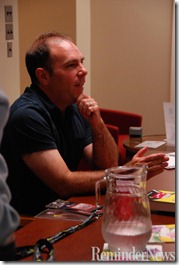
I cringe when I see a bookstore or library advertise one of my upcoming events as a “reading by Matthew Dicks.”
Like I said, there is nothing wrong with this kind of appearance. It’s simply not what I do.
I will not be reading anything at my appearance. I may not even bring a copy of my book with me.
What I plan on doing is telling the story about how Mr. Compopiano inspired me to become a writer in tenth grade by giving me the chance to impress girls with badly written satire.
I’ll tell my audience about how my wife’s family is still convinced that I was once a burglar after reading my first novel.
I’ll describe how two near-death experiences and an armed robbery led to the existential crisis that infuses the protagonist of my latest book.
I’ll explain how some of the first books that I ever read as a child were Jaws and Helter Skelter.
I’ll tell stories from my classroom. Stories about authors who I’ve had the honor of meeting over the years. Stories about my long-suffering wife and my perfect little children. If a story is good, I am likely to tell it.
I’ll make my audience laugh, and if I am lucky, I’ll make them cry, too. And I’ll be sure to tell them why they should be purchasing the work of William Shakespeare, Nicholson Baker, Kate DiCamillo and Billy Collins before they purchase any of mine.
It will be an Author Talk because that is what I do.
That is what I want my audiences to expect to hear when they take a seat before me.
